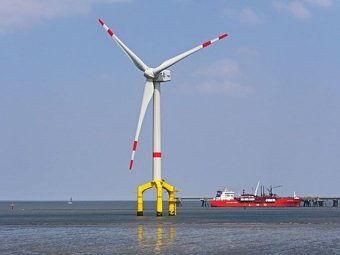
Scotland’s First Minister Nicola Sturgeon will open the world’s first floating offshore wind farm later today in a landmark occasion for the offshore wind sector.
The 30MW Hywind project, developed by Norwegian energy giant Statoil and Abu Dhabi green power company Masdar, will generate enough electricity for around 20,000 homes.
Supporters hope it will mark the start of a new era of offshore wind power, allowing developers to deploy turbines in deeper water where the wind is stronger and capable of delivering higher yields. Experts arealso optimistic that floating turbines could curb costs for the industry, by minimising the need for large foundations and complex installation projects.
“Scotland has developed an international reputation for modern, renewable energy technologies and Hywind Scotland – the world’s first floating wind farm – is testament to that,” Sturgeon said ahead of the official opening.
“This pilot project underlines the potential of Scotland’s huge offshore wind resource and positions Scotland at the forefront of the global race to develop the next generation of offshore wind technologies.”
The farm features five floating turbines 25km from Peterhead in Aberdeenshire, each 253m tall with 78 metres submerged below the water’s surface, and anchored to the seabed using cables.
Later this year there are plans for a 1MWh battery to be installed at the site, which will allow energy from the turbines to be stored for use at times of high demand.
The offshore wind industry welcomed the news, claiming it is breaking new ground with wind technology and generating interest around the world.
“The extraordinary Hywind project is being watched around the world, as floating offshore wind has the potential to be exported globally, with the UK at the heart of this ground-breaking technology,” RenewableUK’s chief executive Hugh McNeal said in a statement. “Innovation is key to the government’s Industrial Strategy, and this is a great example of how offshore wind continues to push the parameters, creating thousands of jobs and delivering billions investment to the UK.”
The official opening of the project represents a further boost to an offshore wind sector that is celebrating after the government last week confirmed it will make over £557m of new support available through a clean energy auction in early 2019. The government’s Clean Growth Strategy also signalled last week that if costs continue to fall across the sector it could deliver a further 10GW of capacity through the 2020s.
In related news, marine renewables firm Atlantis Resources today announced it has generated 2.6GWh of green electricity from its groundbreaking MeyGen tidal turbine array in Scotland’s Pentland Firth.
The site now has all four turbines up and running, delivering a total capacity of 6MW. The company said the array will enter its 25-year operational phase in the coming weeks.
Atlantis CEO Tim Cornelius said the success of MeyGen positions the UK as a leader in tidal power, but warned the firm needs more support from government to proceed with the next phase of the project.
“The industrial opportunities of tidal power for the UK are substantial, but without renewed government support for tidal stream power, the UK is likely to lose jobs and investment overseas,” he said in a statement. “Now is the time for the current government to act to ensure that the economic benefits of the tidal stream industry are preserved for the UK economy, and marine power becomes a meaningful part of the UK’s future renewable energy mix.”
Source: businessgreen.com

